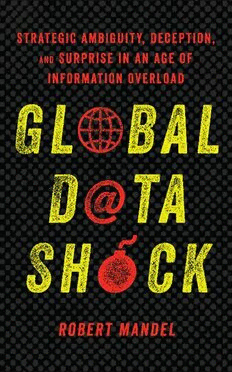Table Of ContentGlobal Data Shock
This page intentionally left blank
Global Data Shock
Strategic Ambiguity, Deception, and Surprise
in an Age of Information Overload
Robert Mandel
Stanford University Press
Stanford, California
Stanford University Press
Stanford, California
©2019 by the Board of Trustees of the Leland Stanford Junior University. All rights reserved.
No part of this book may be reproduced or transmitted in any form or by any means, electronic
or mechanical, including photocopying and recording, or in any information storage or retrieval
system without the prior written permission of Stanford University Press.
Printed in the United States of America on acid-free, archival-quality paper
Library of Congress Cataloging-in-Publication Data
Names: Mandel, Robert, author.
Title: Global data shock : strategic ambiguity, deception, and surprise in an age of
information overload / Robert Mandel.
Description: Stanford, California : Stanford University Press, 2019. | Includes
bibliographical references and index.
Identifiers: LCCN 2018052654 (print) | LCCN 2018056416 (ebook) | ISBN 9781503608979
(e-book) | ISBN 9781503608252 (cloth; alk. paper) | ISBN 9781503608962 (pbk.; alk. paper)
Subjects: LCSH: National security. | Security, International. | Intelligence service. |
Information resources management. | Disinformation.
Classification: LCC UA10.5 (ebook) | LCC UA10.5 .M327 2019 (print) | DDC 355/.033—dc23
LC record available at https://lccn.loc.gov/2018052654
Typeset by Newgen in 10/14 Minion
Cover design: Christian Fuenfhausen
Information Overload
A wealth of information creates a poverty of attention.
—Herbert A. Simon (American decision theorist), “Designing
Organizations for an Information-Rich World”
It’s not information overload. It’s filter failure.
—Clay Shirky (American Internet expert), “It’s Not
Information Overload; It’s Filter Failure”
There’s a danger that too much stuff cramming in on
people’s minds is just as bad for them as too little, in terms
of the ability to understand, to comprehend.
—Bill Clinton (American president), quoted in Todd S.
Purdum, “Clinton Plans to Lift Public out of ‘Funk’”
Ambiguity
There is no greater impediment to the advancement of
knowledge than the ambiguity of words.
—Thomas Reid (Scottish philosopher), Inquiry and Essays
Accepting that the world is full of uncertainty and ambigu-
ity does not and should not stop people from being pretty
sure about a lot of things.
—Julian Baggini (British philosopher), “What Is This Foolish
Lust for Uncertainty?”
Speech was given to man to disguise his thoughts.
—Charles Maurice de Talleyrand (French statesman and
diplomat), quoted in Bertrand Berère, Memoirs of
Bertrand Berère, vol. 4
Deception
In time of war, when truth is so precious, it must be at-
tended by a bodyguard of lies.
—Winston Churchill (British prime minister),
The Second World War, vol. 5
Though fraud in other activities be detestable, in the man-
agement of war it is laudable and glorious, and he who
overcomes an enemy by fraud is as much to be praised as he
who does so by force.
—Niccolò Machiavelli (Italian historian and statesman),
The Art of War
Life is the art of being well deceived; and in order that the
deception may succeed it must be habitual and uninter-
rupted.
—William Hazlitt (British writer), The Round Table
Surprise
War is, at first, the hope that one will be better off, then,
the expectation that the other fellow will be worse off, then,
the satisfaction that he isn’t any better off, and finally, the
surprise at everyone’s being worse off.
—Karl Kraus (Austrian writer), Half-Truths and
One-and-a-Half Truths
Always mystify, mislead, and surprise the enemy, if possible.
—Stonewall Jackson (American soldier), quoted in John D.
Imboden, “Stonewall Jackson in the Shenandoah”
Man [has] a limited capacity for change. When this capacity
is overwhelmed, the consequence is future shock.
—Alvin Toffler (American futurist), Future Shock
Contents
List of Figures and Tables ix
Acknowledgments xi
Introduction 1
1 Global Information Overload 5
2 Global Strategic Manipulation 33
3 Global Data Shock Case Studies 57
4 Emerging Case Patterns 146
5 Managing Global Data Shock 166
Conclusion 195
Notes 205
Index 247
This page intentionally left blank
Figures and Tables
Figures
1.1 Information interpretation barriers 19
1.2 How escalating information overload can impede data
interpretation 21
1.3 How security information unreliability can impede data
interpretation 22
1.4 How human cognitive frailty can impede data interpretation 25
1.5 How organizational decision inflexibility can impede data
interpretation 27
1.6 How global cultural diversity can impede data interpretation 29
1.7 How international political anarchy can impede data
interpretation 31
2.1 Linking information overload to ambiguity, deception,
and surprise 35
2.2 How information overload can transform strategic
manipulation 37
2.3 Offensive manipulation versus defensive response goals 41
5.1 Global data shock mismanagement 168
5.2 Improving offensive manipulation under information overload 182
ix

